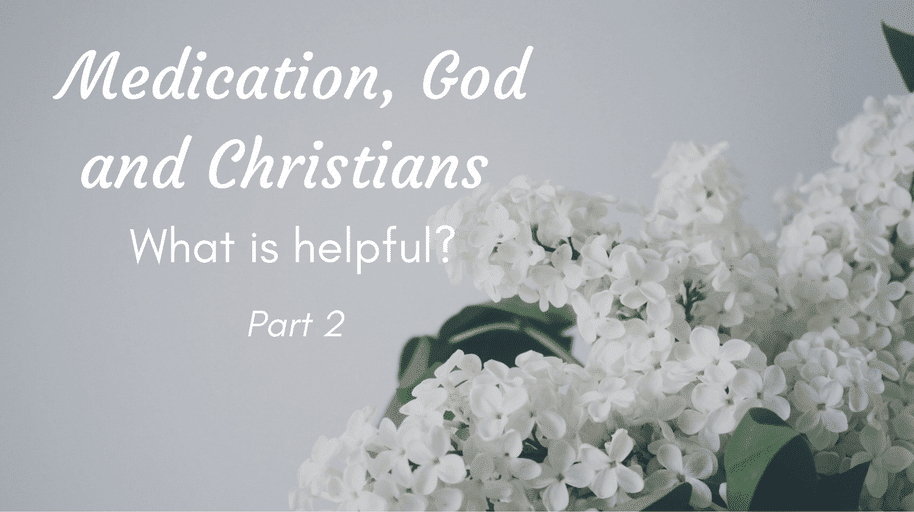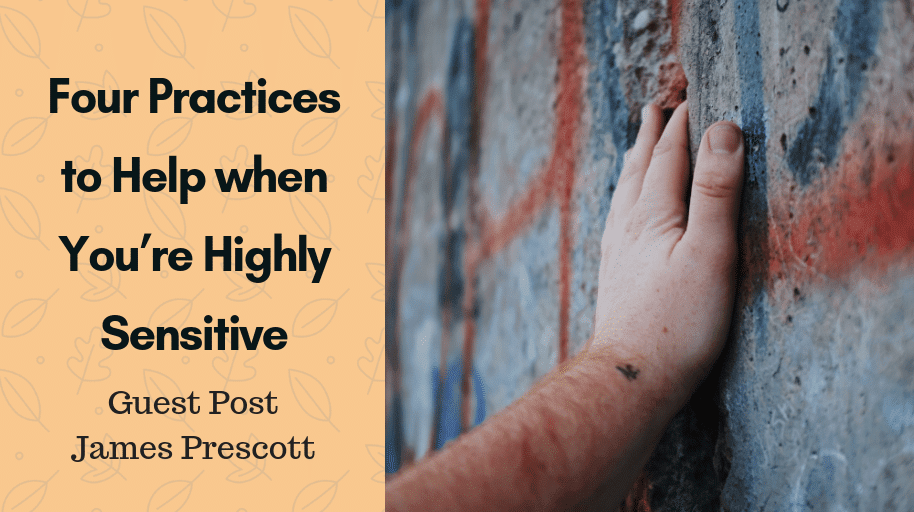It is one of those memories that is special to me. I was very unwell as a child with eczema and asthma. My parents asked if our pastor and a few others could come and pray for me.
They were following the advice we find in James 5:14. We had communion together and then they put some oil on my forehead and asked God to heal my illnesses. [pullquote]Are you sick? Call the church leaders together to pray and anoint you with oil in the name of the Master. James 5:14[/pullquote]
I wouldn’t say there was any miraculous instantaneous healing. No thunderous change took place, but I knew that I was not alone and that some godly men and women loved me and prayed for me.
Over time those illnesses left me. Yes, I took medication, and I think the combination of prayer, medication, and other activities helped me heal.
Perhaps in that simple gift of grape juice and bread, with a dab of oil on the forehead, there was some medicinal component. Perhaps here within them, there was some divine spark of change.
When I was a pastor, one of the most precious moments I had was when I prayed with people and anointed them with oil.
Anointing is such a big word and probably overused and overloaded with too much hype in some church circles, but for me, it was just putting a dab of oil on the forehead and praying.
Often my prayers, if for a mental health-related issue, would be for the small, simple things such as the neurons of the brain connecting properly, for those that were helping and supporting them, for quietness in thinking.
I wanted the person to understand that small change is just as miraculous as large. So no hype was given. I also prayed that the medication would work and help the brain to function properly.
You see God desires prayer to be part of the healing package alongside other interventions.
There is a rather sad, but amusing, story of a man caught in rising floodwaters waters who prayed but didn’t see the help offered to him.
Medication can be like a helicopter or a rowboat
A very religious man was once caught in rising floodwaters. He climbed onto the roof of his house and trusted God to rescue him. A neighbour came by in a canoe and said, “The waters will soon be above your house. Hop in, and we’ll paddle to safety.”
“No thanks” replied the religious man. “I’ve prayed to God, and I’m sure he will save me.”
A short time later the police came by in a boat. “The waters will soon be above your house. Hop in, and we’ll take you to safety.”
“No thanks” replied the religious man. “I’ve prayed to God, and I’m sure he will save me.”
A little time later a rescue services helicopter hovered overhead, let down a rope ladder and said. “The waters will soon be above your house. Climb the ladder and we’ll fly you to safety.”
“No thanks” replied the religious man. “I’ve prayed to God, and I’m sure he will save me.”
All this time the floodwaters continued to rise until soon they reached above the roof, and the religious man drowned. When he arrived at heaven, he demanded an audience with God. Ushered into God’s throne room, he said, “Lord, why am I here in heaven? I prayed for you to save me, I trusted you to save me from that flood.”
“Yes, you did my child” replied the Lord. “And I sent you a canoe, a boat, and a helicopter. But you never got in.”
Source: unknown.
I often think of this story and line it up with the quote ‘You can lead a horse to water, but you can’t make it drink’ to which I add ‘you can take the water to the horse, sprinkle rose petals on top, and it still won’t drink’.
Do we deny God is bringing to us the gift of medication as a canoe to our crisis or a glass of cool water to our brain’s thirst?
Some people argue that medication is not mentioned in the bible so therefore we should not use it. That we should wait for some sort of miraculous healing. To this, I discuss some examples where a substance was used or advised to be used for an illness.
Medication can be like a mud pack and a glass of wine
In the Bible, we see many examples where something other an act of power brought healing. It may have been the use of a substance or a direction to do something.
- Now Isaiah had said, “Let them take a cake of figs and apply it to the boil, that he may recover.” Isaiah 38:21
- No longer drink only water, but use a little wine for the sake of your stomach and your frequent ailments. 1 Timothy 5:23
- He went to him and bound up his wounds, pouring on oil and wine. Then he set him on his own animal and brought him to an inn and took care of him. Luke 10:34
- After saying this, he [Jesus] spit on the ground, made some mud with the saliva, and put it on the man’s eyes. John 9:6, 7
Medication must be woven in with prayer and patience
Medication is only part of the healing package. For some, there is a belief that just getting the right medication at the right dosage is their only hope. It is right, medication has a powerful influence on mental wellness, but equally I would suggest are prayer, patience, exercise and many other things we talk about here.
For some, there is a belief that just getting the right medication at the right dosage is their only hope. Medication does have a powerful influence on mental wellness, but equally, I would suggest are prayer, patience, exercise and many other things we talk about here.
Questions to answer
- What ‘helicopters and rowboats’ does God send our way that we fend off looking for a supernatural intervention?
- What small, but significant, things do you ask for in your prayer life?
- How do you respond to the idea of the simple elements of bread, wine, and oil being of some medicinal value?
Quotes to consider
- If you had cancer, you would not worry about telling people you were on chemotherapy – but why is it that we are afraid to tell people we are taking antidepressants? Is it because we are worried we will be seen as weak, fragile, even stupid? And in a church, will we be told we do not have enough faith, that we need to pray or study the Bible more. Mind and Soul
Barry Pearman
Image by Veri Ivanova






8 thoughts on “MEDICATION, GOD AND CHRISTIANS. WHAT IS HELPFUL? PART 2”
Barry, I really appreciate this article as well as the first one. Your words brought such comfort to me and arrived in perfect time.
Thank Trisha, glad it was helpful
So helpful, Barry. I’m posting this so that my FB friends can read it, too.
Thanks! @chaplaineliza
Great, thanks Elizabeth
Hi Barry, Thanks for your reflections. In the Apocrypha, Book of Sirach (or known as Ecclesiasticus) Chapter 38 is “Concerning Physicians and Health”: “Honour physicians for their services, for the Lord created them; for their gift of healing comes from the Most High… The Lord created medicines out of the earth, and the sensible will not despise them…. And He gave skill to human beings that He might be glorified in His marvelous works. By them the physician heals and takes away pain. God’s works will never be finished and from Him health spreads over all the earth.
My child, when you are ill, do not delay, but pray to the Lord and he will heal you… Cleanse your heart from all sin…. Then give the physician his place for the Lord created him; do not let him leave you for you need him. There may come a time when recovery lies in the hands of the physicians for they too pray to the Lord that he grant them success in diagnosis and in healing for the sake of preserving life.”
Best wishes.
Hi Fiona, thanks for this. I did not know this was in Apocrypha. Very apt!
It’s just not Christians who struggle with taking medications for their mental health. In my work as a MH nurse in a GP practice I find that people will tell me that they are struggling with depression and anxiety but then they are reluctant to take an antidepressant.
I often say to them, if you were told you had diabetes (because your pancreas isn’t secreting sufficient insulin) and you need to take medication, you probably wouldn’t hesitate to take it. And here, the most important organ in your body (your brain) isn’t producing enough serotonin and other essential neurotransmitters and some how we expect that you can think yourself better. It just won’t work like that. An unwell brain, can’t just think itself better. Often the brain needs a rest from all the over-thinking (this is where practicing mindfulness is brilliant) but also some help to re-establish the right chemical balance to be able to think properly again.
When we are well again we can reflect back on all the unhealthy things that were going on and see that our thinking is distorted – the guilts, the ‘shoulds’ and the ‘musts’, everything being so hard, the lack of enjoyment etc – all of that are the signs and symptoms of this insidious disease called depression. I think it helps to recognise that it is an illness and never a personal failing on our behalf. And it’s an illness for which there is helpful treatment. Why not utilise it?
Thanks Susanna, so true. I think Medication for the brain can influence so many different areas in our lives. Great points.